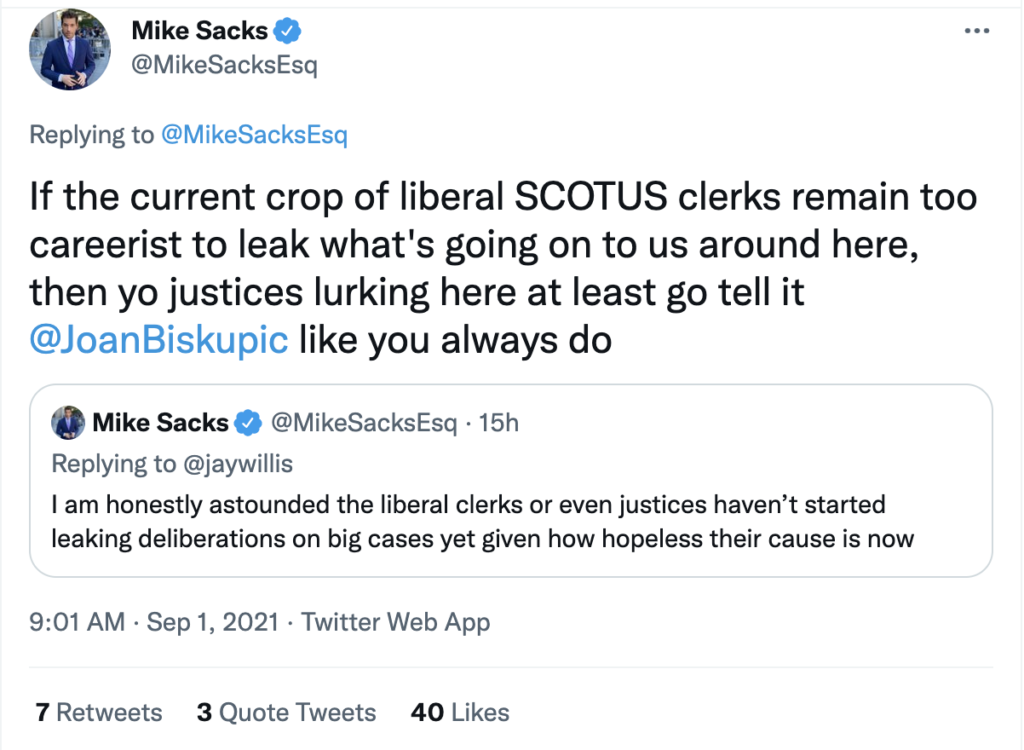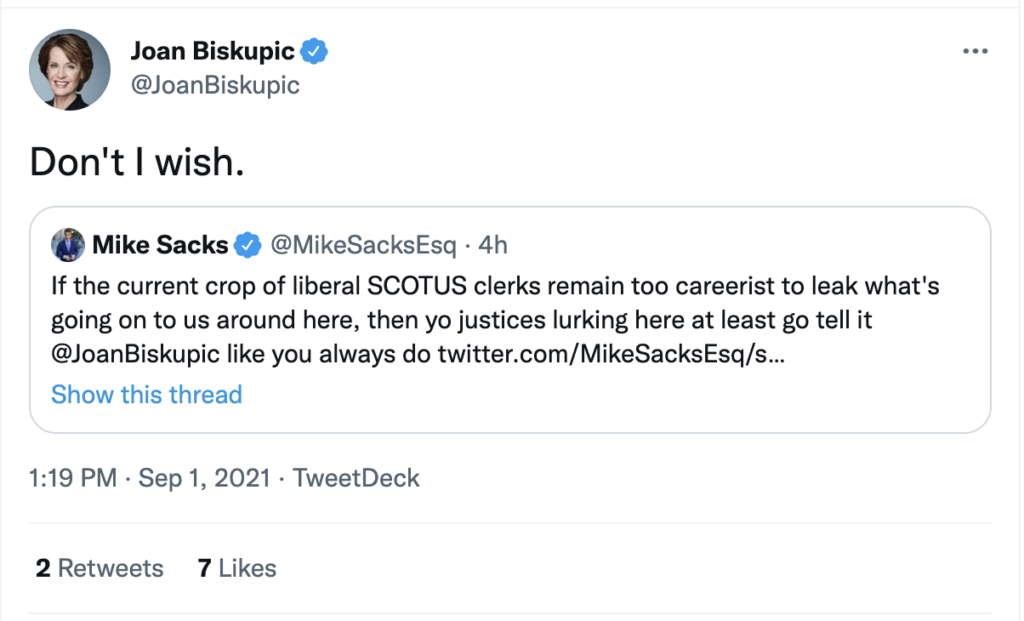Over the past several years, CNN Reporter Joan Biskupic has received leaks from the Supreme Court. It is not clear if she is talking to the Justices, to law clerks, or to people who know the Justices or law clerks. Based on these leaks, Joan wrote about private conferences, internal deliberations, changes in opinion authorship, and even personal dynamics between the Justices. These leaks are intriguing, but ultimately, dangerous for the Court.
I don’t blame Biskupic. She is a committed reporter who does her job. It isn’t her role to preserve the Court. Her job is to report. And she does it better than just about anyone else.
Shortly after the October 2020 term concluded, I started the countdown for Biskupic’s next leaks. But this year was different. Her reporting from the current term lacked any inside information. I speculated that Justice Ginsburg’s absence may have dried up her sources.
Now, here we are in early September. The Supreme Court’s shadow docket is in overdrive. And people are clamoring for inside information about the Court’s deliberations. But Biskupic has not published any inside information.
Mike Sacks tweeted, “I am honestly astounded the liberal clerks or even justices haven’t started leaking deliberations on big cases yet given how hopeless their cause is now.” He added, “If the current crop of liberal SCOTUS clerks remain too careerist to leak what’s going on to us around here, then yo justices lurking here at least go tell it @JoanBiskupic like you always do.”

Joan replied, “Don’t I wish.”

I was shocked by this tweet. I don’t recall ever seeing a Supreme Court reporter make a public appeal to the Justices to leak information. Usually, these entreaties are made through backchannels. But Joan has now sent out the Bat Signal, seeking help. Leaking private deliberations violates the canons of judicial ethics. Granted, the Supreme Court justices are not bound by the code of judicial conduct, but they generally purport to follow the rules. Here, Joan is publicly asking Justices to violate their code of conduct.
The first analogy that came to mind was when Trump asked Russia to release Hillary’s emails. Trump later claimed he was joking. Maybe Joan will also say she was being sarcastic. It doesn’t matter. The damage was done.
Ultimately, this cavalier approach to leaks may be counterproductive. If Joan does write something about internal deliberations, the presumption will be that her Bat Signal tweet stirred the pot. Justices, and those in their orbit, who may have been tempted to feed Joan would look elsewhere.
Yesterday, I wrote about Joan’s podcast with SCOTUSBlog. The real reason I transcribed the session was to see if Joan discussed her leaks. And she did (starting at 20:20):
Now as I, as I’m working on these books. And as I worked on the Chief’s book, I was also trying to add something for readers about the behind-the-scenes dynamic that would inform the current court. And I think that I think I first got a taste of that when I was doing the book on Justice Sotomayor. The book I wrote about Justice Sotomayor, which follows the Antonin Scalia book was not a biography, like the O’Connor and Scalia books were it was much more of a political history. But because while I was doing that, I got some inside information about some, you know, some events at the court and switched votes. For example, what happened behind the scenes when they the justices first took up the University of Texas at Austin case that had been brought up by Abigail Fisher, the affirmative action case, that kind of gave me a taste for finding out more of what was happening behind the scenes. So I, I found that I was pivoting a little bit to try to get more up-to-date information of what was happening, even though I was looking back at people’s lives. And that’s why when I did the Chief, the book on the Chief, it was a real pleasure to go to Johnstown, Pennsylvania, where his parents had met, grown up and, you know, go to the library there to study the ethnic history of his family. But it was also quite challenging to find out, for example, what had really happened in the first Affordable Care Act case where he, you know, we had known that he had changed his vote on the individual insurance mandate, because of the reporting Jan Crawford had done. But I found that along the way, that he also switched his vote on the Medicaid portion. And I became interested in that and wanting to pull that out of various sources at the court. And that has become a nice challenge to have. And that sort of subtext of of my reporting is not, you know, it’s not the main thing that I want people to take from these books, because I want them to be, you know, character studies. But it’s been a nice little bonus. And it’s helped bring more attention to the reporting, because people, people hardly know anything about what’s going on behind the scenes. The court carefully guards a lot of this. And it’s been, I felt fortunate that I’ve been able to find out some things.
I hope the Justices, and their clerks, exercise even greater discipline to avoid further leaks. Let Joan keep wishing.
from Latest – Reason.com https://ift.tt/3BzwEP4
via IFTTT